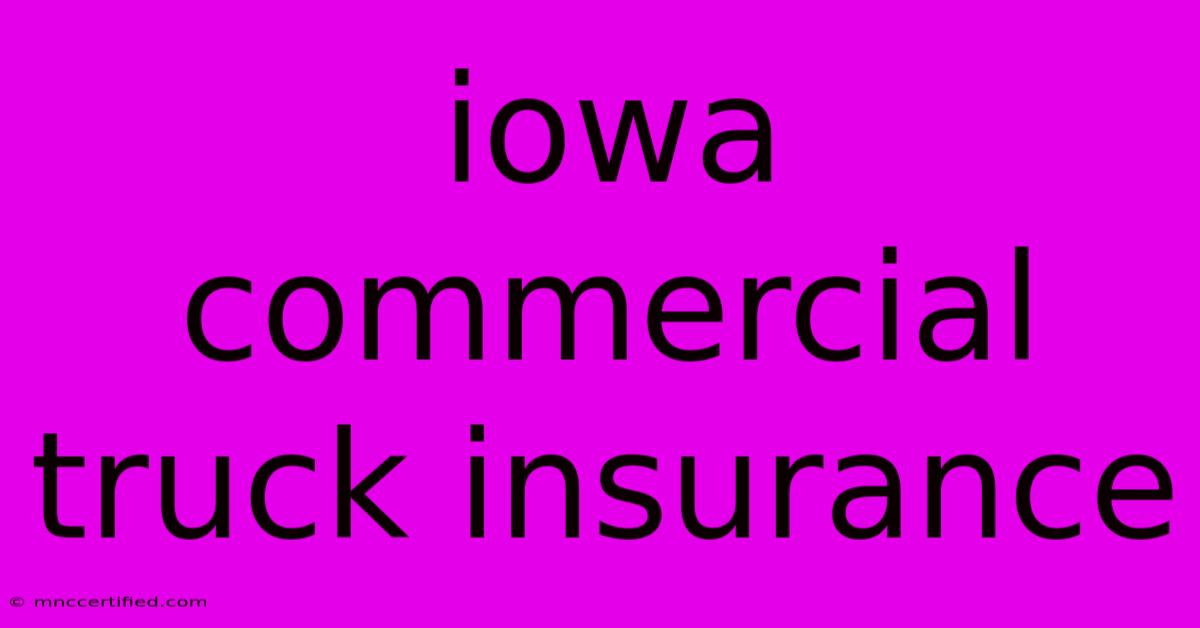Iowa Commercial Truck Insurance

Table of Contents
Navigating the Roads of Iowa: Your Guide to Commercial Truck Insurance
Finding the right commercial truck insurance in Iowa can feel like navigating a complex highway system. But with the right information and understanding, securing adequate coverage becomes significantly easier. This comprehensive guide will equip you with the knowledge to choose the best policy for your business needs and comply with Iowa's regulations.
Understanding Iowa's Commercial Truck Insurance Requirements
Iowa, like other states, mandates minimum insurance coverage for commercial vehicles. These requirements vary depending on the type of vehicle and its use. Failing to meet these minimums can result in significant fines and legal repercussions. It's crucial to understand:
- Minimum Liability Coverage: This covers bodily injury and property damage caused by accidents involving your commercial truck. Iowa's minimums are often insufficient for the potential costs associated with serious accidents involving large trucks.
- Cargo Insurance: If you transport goods for others, cargo insurance protects against loss or damage to the goods during transit. This is a critical aspect for many Iowa businesses.
- Physical Damage Coverage: This covers damage to your truck itself, whether from accidents, theft, or vandalism. This is especially important for the high value of commercial trucks.
- Bobtail Insurance: If your truck is involved in an accident while not hauling a load (unhooked from a trailer), bobtail insurance covers liability.
- Non-Trucking Use Coverage (NTU): This covers situations where your truck is involved in an accident while not being used for commercial purposes.
Factors Influencing Your Iowa Commercial Truck Insurance Costs
Several factors significantly impact the cost of your Iowa commercial truck insurance:
- Type of Truck: The size, weight, and type of your truck directly affect your premiums. Larger trucks pose a higher risk and therefore higher costs.
- Driver History: Clean driving records translate to lower premiums. Companies heavily scrutinize driver safety records.
- Years of Experience: Experienced drivers often receive better rates due to lower accident probabilities.
- Business Type: The nature of your business and the type of goods you haul influence risk assessment and premiums.
- Miles Driven: Higher mileage generally means higher premiums, as it increases exposure to accidents.
- Safety Features: Trucks equipped with advanced safety technologies, such as electronic stability control, might qualify for discounts.
Finding the Right Iowa Commercial Truck Insurance Provider
Shopping around for commercial truck insurance is crucial to securing the best rates and coverage. Consider these factors:
- Reputation and Financial Stability: Choose a reputable insurer with a strong financial standing to ensure claims are paid promptly.
- Customer Service: Look for an insurer known for its excellent customer service and responsive claims handling.
- Coverage Options: Compare policies carefully to ensure you have the right coverage for your specific needs and risks.
- Discounts: Inquire about available discounts, such as those for safety programs, multiple-truck policies, or defensive driving courses.
- Online Quotes: Many insurers offer online quote tools, allowing you to quickly compare prices and coverage options.
Key Considerations for Iowa Businesses
Iowa's unique geographic features and economic landscape impact commercial trucking. Consider:
- Seasonal Variations: Weather conditions can impact road conditions, leading to increased accident risks during certain times of the year.
- Agricultural Transportation: If you're involved in agricultural hauling, specific coverage might be required to address unique risks.
- Local Regulations: Stay updated on any changes in Iowa's commercial trucking regulations to ensure your insurance complies with all legal requirements.
Protecting Your Business: Don't Underestimate the Importance of Proper Coverage
Securing adequate commercial truck insurance in Iowa is not just a legal requirement; it's a crucial step in protecting your business from potential financial ruin. Don't hesitate to consult with an insurance professional to discuss your specific needs and find the best policy for your operations. Remember, the cost of inadequate coverage far outweighs the premium cost of a comprehensive and appropriate policy. Prioritize safety, comply with regulations, and protect your investment.

Thank you for visiting our website wich cover about Iowa Commercial Truck Insurance. We hope the information provided has been useful to you. Feel free to contact us if you have any questions or need further assistance. See you next time and dont miss to bookmark.
Featured Posts
-
Judge Rules Against Trump On 2020 Election
Nov 26, 2024
-
Nfl News Eli Apple Roster Update
Nov 26, 2024
-
Jimmy Johnson Investment Banker
Nov 26, 2024
-
Adele Cries Vegas Show Concludes
Nov 26, 2024
-
Outlook Email Issues Microsoft 365 Outage
Nov 26, 2024